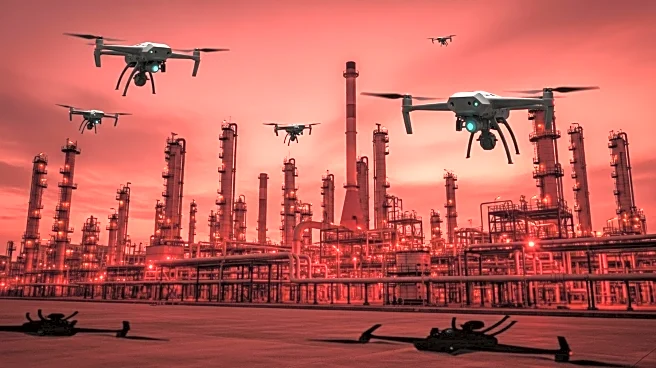What is the story about?
What's Happening?
Ukrainian drones targeted a chemical plant in Russia's Krasnodar Krai, igniting a fire and prompting an evacuation, according to Russian independent media outlet Astra. The attack occurred overnight on September 25, 2025, affecting EuroChem-Belorechensk Fertilizers, a significant producer of fertilizers in southern Russia. The facility specializes in nitrogen and complex fertilizers and also produces phosphorus-based products and sulfuric acid, which are crucial for ammunition manufacturing. The fire covered an area of 50 square meters, leading to the evacuation of approximately 140 employees to a protective shelter. The plant has reportedly halted operations following the attack. This incident is part of a series of Ukrainian drone strikes targeting Russian infrastructure supporting the war effort.
Why It's Important?
The attack on EuroChem-Belorechensk Fertilizers highlights the ongoing strategic efforts by Ukraine to disrupt Russian supply chains critical to its military operations. The facility's production of sulfuric acid, a key component in ammunition manufacturing, underscores its importance to Russia's war capabilities. The halt in operations could impact Russia's agricultural and industrial sectors, given EuroChem's central role. Additionally, the attack reflects the broader geopolitical tensions, with Ukraine intensifying its offensive against Russian infrastructure. This development may further strain Russia's resources and complicate its military logistics, potentially affecting its operational effectiveness in the ongoing conflict.
What's Next?
The Russian Defense Ministry has claimed to intercept multiple Ukrainian drones across various regions, indicating a heightened state of alert and potential escalation in defensive measures. The continued targeting of strategic sites by Ukraine suggests a persistent effort to weaken Russia's war infrastructure. This may lead to increased military responses from Russia, including bolstered air defenses and retaliatory strikes. The international community, particularly NATO and the EU, may closely monitor these developments, considering the implications for regional security and the potential for further escalation.
Beyond the Headlines
The attack on the chemical plant raises ethical and legal questions regarding the targeting of civilian infrastructure in conflict zones. While the facility supports military operations, its primary function is industrial, affecting civilian workers and local communities. This blurs the lines between military and civilian targets, potentially complicating international legal standards governing warfare. The incident also highlights the evolving nature of modern warfare, where drones and cyber tactics play increasingly significant roles, challenging traditional military strategies and defense systems.
















